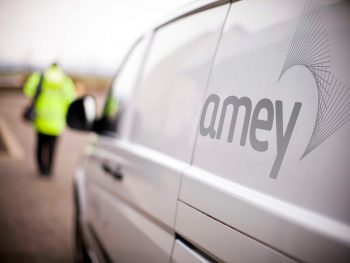New cases studies revealing how the construction, infrastructure services and highways sectors have slashed accident rates and maintenance and fuel bills are now available through the Driving for Better Business programme.

According to the HSE, on average, each year, about seven workers die from accidents involving vehicles or mobile plant on construction sites. A further 93 are seriously injured.
But work by major firms such as Balfour Beatty and Amey show how fleets can tackle road risk management effectively, simply by adopting a systematic approach to fleet and risk management with the help of the free, government-backed Driving for Better Business (DfBB) programme.
And the businesses have shared their stories – including the challenges they faced, how they met those challenges, and the benefits they’ve seen as a result of engaging with the DfBB programme – on the scheme’s website.
Highlights include the work by Balfour Beatty, which manages the road risk of around 12,000 drivers. Over the last six years, the construction company reported that its crash frequency rate fell by 63% – equivalent to £570,000 of annual benefits.
Meanwhile, Amey, responsible for 11,000 drivers, saw its at-fault incidents fall 38% over 12 months, from 1,380 in 2016 to 89 in 2018.
And Carnell, a specialist in road maintenance, has some 280 operatives, 200 vehicles covering 4 million miles a year. It reported a reduction in annual insurance claims costs from £130,000 to £46,000 and the number of driver interventions – such as post-crash interviews and further training – down a staggering 85% over a three-year period, significantly reducing the demands on admin and management time.
Other success stories on the DfBB website include WJ, the Costain Group Plc, Clancy Docwra and Skanska.
Simon Turner, campaign manager for Driving for Better Business, said: “There is clearly a strong business case for managing work-related road safety. Fewer road incidents mean fewer days lost to injury; fewer repairs to vehicles with vehicles out of action; fewer missed orders and overall reduced running costs. Now is the time to become better informed and start getting the benefits of better practice.”
Dave Conway, road safety manager at transport and construction company FM Conway, added: “If you are going to persuade a business to adopt these systems there needs to be a business case. Within the first year of adopting the system, we found ourselves with a £56,000 reduction in our fleet insurance premium. That’s a sound business case.”
Earlier this year, Driving for Better Business highlighted the important role of trade associations in raising awareness and setting standards of safety – particularly in the construction sector. Tippers and open-topped trucks are the vehicles most likely to have insecure, while light commercial vehicles are also more likely to be overloaded or insecure
For more on the business case for reducing road risk in organisations, visit https://www.drivingforbetterbusiness.com/business-benefits/
Case studies are available https://www.drivingforbetterbusiness.com/case-studies/.

